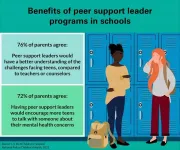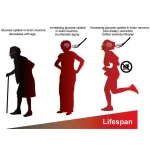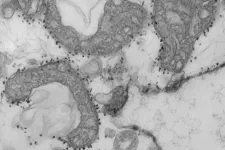(Press-News.org) ANN ARBOR, Mich. -- An estimated one in five teenagers has symptoms of a mental health disorder such as depression or anxiety, and suicide is the second leading cause of death among teens.
But the first person a teen confides in may not always be an adult - they may prefer to talk to another teen.
And three-quarters of parents in a new national poll think peers better understand teen challenges, compared to teachers or counselors in the school. The majority also agree that peer support leaders at school would encourage more teens to talk with someone about their mental health problems, according to the C.S. Mott Children's Hospital National Poll on Children's Health at Michigan Medicine.
"Peers may provide valuable support for fellow teens struggling with emotional issues because they can relate to each other," says Mott Poll Co-Director Sarah Clark, M.P.H.
"Some teens may worry that their parents will overreact or not understand what they're going through. Teachers and school counselors may also have limited time to talk with students in the middle of other responsibilities."
Previous research suggests that as many as half of children and teens who have at least one treatable mental health disorder may not receive treatment due to several barriers. But teens who don't have a diagnosed condition may still experience occasional problems with emotions, peer and family relationships, anxiety, academic challenges, substance abuse or other issues negatively impacting self-esteem.
These type of situations may increase risk of developing or triggering depression during tween and teen years, experts say.
Some schools have instituted peer support leaders to give teens safe channels to share problems. Teens who serve as mentors in these programs are trained with oversight from teachers, counselors or mental health professionals. They are available to talk with their fellow students on a walk-in basis at a designated place at school or by referral from school staff.
"We have seen strong examples of school programs that prepare teens to be good listeners and to identify warning signs of suicide or other serious problems," Clark says.
"The peer support mentors' role is to listen, suggest problem solving strategies, share information about resources, and, when appropriate, encourage their fellow student to seek help. The most essential task is to pick up on signs that suggest the student needs immediate attention, and to alert the adults overseeing the program. While this doesn't replace the need for professional support, these programs offer young people a non-threatening way to start working through their problems."
The nationally-representative poll report included responses from 1,000 parents of teens ages 13-18 about their views on programs like peer support leaders.
Weighing Benefits and Concerns of Peer Support
Most parents say they see benefits to peer mentor programs. Thirty-eight percent believe if their own teen was struggling with a mental health problem, their teen would likely talk to a peer support leader and 41% of parents say it's possible their teen would take advantage of this option. Another 21% say it's unlikely their child would seek support from a peer mentor.
However, parents did express some concerns about peers providing mental health support to fellow teens as well. Some worried about whether a peer would keep their teen's information confidential (62%), if the peer leader would know when and how to inform adults about a problem (57%), if the peer leader would be able to tell if their teen needs immediate crisis help (53%), and if teens can be trained to provide this kind of support (47%).
"Some of parents' biggest concerns pertained to whether the peer leader would be able to tell if their teen needed immediate professional intervention and how to initiate those next steps," Clark says.
Despite these concerns, a third of parents still say they "definitely favor" having a peer support leaders program through their teen's school, while 46% say they would probably support such a program.
A quarter of parents also say their teen's school already has some type of peer support program - and these parents are twice as likely to favor such efforts.
"This suggests that parent support increases once they understand how peer support programs work," Clark says. "Most parents agree with the rationale for peer support programs but may be uncertain until they see how they operate and benefit students."
Two in three parents, or 64%, would also allow their teen to be trained as a peer support leader, recognizing the benefits to the community, the school and their child's individual growth.
However, roughly half of parents worried whether there would be sufficient training and that their teen may feel responsible if something bad happened to a student using the program. About 30% weren't sure if their teen was mature enough to serve as a peer support leader.
"Most parents approve of their teen being trained as a peer support leader, seeing it at as an opportunity to develop leadership skills and better understand the challenges that different teens face," Clark says. "But many also wanted reassurance that teens in these roles would have the adult guidance and support necessary to deal with difficult emotional situations."
"Close connection to knowledgeable adults is an essential part of any school-based peer mental health program, particularly in regards to suicide prevention," she says.
Clark says parents of teens considering service as a peer support leader may want to learn more about the training and resources offered, including whether the peer support leaders receive counseling and support in the event of a negative outcome.
She adds that when it comes to young people's mental health, "it takes a village" to support them and help identify warning signs that they may be in trouble.
"The adults in teens' lives - including parents, teachers and other mentors - serve critical roles during challenging times," Clark says. "But peers may also be an untapped resource to help teens who need someone to talk to."
INFORMATION:
New research examining more than 800,000 traffic stops in Vermont over the course of five years substantiates the term "driving while Black and Brown."
Compared to white drivers, Black and Latinx drivers in Vermont are more likely to be stopped, ticketed, arrested, and searched. But they are less likely to be found with contraband than white drivers. The report finds evidence not only of racial disparities but also racial bias in policing. What's more, a number of these gaps widened over the years examined in the report. With such comprehensive data encompassing the state of Vermont, the authors also found that Vermont police stop cars at a rate ...
A student infected with COVID-19 returning home from university for Christmas would, on average, have infected just less than one other household member with the virus, according to a new model devised by mathematicians at Cardiff University and published in END ...
Variation in consumption of market-acquired foods outside of the traditional diet -- but not in total calories burned daily -- is reliably related to indigenous Amazonian children's body fat, according to a Baylor University study that offers insight into the global obesity epidemic.
"The importance of a poor diet versus low energy expenditure on the development of childhood obesity remains unclear," said Samuel Urlacher, Ph.D., assistant professor of anthropology at Baylor University, CIFAR Azrieli Global Scholar and lead author of the study. "Using gold-standard measures of energy expenditure, we show that relatively lean, rural forager-horticulturalist children in the Amazon spend approximately the same total number of calories each day as their much ...
Spiritualist mediums might be more prone to immersive mental activities and unusual auditory experiences early in life, according to new research.
This might explain why some people and not others eventually adopt spiritualist beliefs and engage in the practice of 'hearing the dead', the study led by Durham University found.
Mediums who "hear" spirits are said to be experiencing clairaudient communications, rather than clairvoyant ("seeing") or clairsentient ("feeling" or "sensing") communications.
The researchers conducted a survey of 65 clairaudient spiritualist mediums from the Spiritualists' National Union and 143 members of the general population in the ...
Tokyo, Japan - Researchers from Tokyo Metropolitan University have discovered that fruit flies with genetic modifications to enhance glucose uptake have significantly longer lifespans. Looking at the brain cells of aging flies, they found that better glucose uptake compensates for age-related deterioration in motor functions, and led to longer life. The effect was more pronounced when coupled with dietary restrictions. This suggests healthier eating plus improved glucose uptake in the brain might lead to enhanced lifespans.
The brain is a particularly power-hungry part of our bodies, consuming 20% of the oxygen we take in and 25% of the glucose. That's why it's so important that it can stay powered, ...
The spread of COVID-19 in Brazil overwhelmed the health systems in all the country's regions, particularly in areas where they were already fragile, according to a collaborative effort involving the Barcelona Institute for Global Health (ISGlobal), an institution supported by the "la Caixa" Foundation, the University of Sao Paulo, the Catholic University of Rio de Janeiro, the D'Or Institute of Research and Education and the Oswaldo Cruz Foundation. The findings, published in The Lancet Respiratory Medicine, reveal that a large percentage of COVID-19 patients that were hospitalised in Brazil required intensive care and respiratory support, and many did not survive.
The COVID-19 pandemic has put an enormous strain on healthcare ...
BOSTON - The Study on Stress, Spirituality and Health (SSSH), a cutting-edge proteomics analysis, suggests that religious beliefs modulate protein expression associated with cardiovascular disease in South Asians in the United States. The research, published by investigators from Massachusetts General Hospital (MGH) and Beth Israel Deaconess Medical Center (BIDMC) and the University of California San Francisco (UCSF) in Scientific Reports, demonstrates that spiritual struggles, in particular, significantly modify the impact of unique proteins on risk of developing cardiovascular disease (CVD) in U.S. South Asians, a community that has especially ...
One of the most vexing aspects of the COVID-19 pandemic is doctors' inability to predict which newly hospitalized patients will go on to develop severe disease, including complications that require the insertion of a breathing tube, kidney dialysis or other intensive care. Knowledge of a patient's age and underlying medical conditions can help predict such outcomes, but there are still surprises when younger, seemingly healthier patients suffer severe complications that can lead to death.
Now, scientists at Washington University School of Medicine in St. Louis have shown that a relatively simple and rapid blood test can predict -- within a day of a hospital admission -- which patients with ...
MIAMI--A group of more than 60 scientists have provided recommendations to improve the Indian Ocean Observing System (IndOOS), a basin-wide monitoring system to better understand the impacts of human-caused climate change in a region that has been warming faster than any other ocean.
The group, led by Lisa Beal, professor of ocean sciences at the University of Miami (UM) Rosenstiel School of Marine and Atmospheric Science, provides a road map for an enhanced IndOOS to better meet the scientific and societal needs for more reliable environmental forecasts in the next decade. The 136 actionable recommendations from the three-year, internationally coordinated review were published in the Bulletin of the American Meteorological Society.
The scientists call for four major ...
A University of Saskatchewan study has found that the COVID-19 pandemic has led to significant worsening of already poor dietary habits, low activity levels, sedentary behaviour, and high alcohol consumption among university students.
The findings of the study--the first to assess changes in students' dietary intake, physical activity, and sedentary behaviour before and during the pandemic--are published today in the journal Applied Physiology, Nutrition and Metabolism.
"Our findings are important because university students, especially those most vulnerable for poor nutrition and sedentary behaviour, should be targeted for interventions aimed at maintaining and improving physical activity and dietary practices during this pandemic and beyond," said lead author ...






